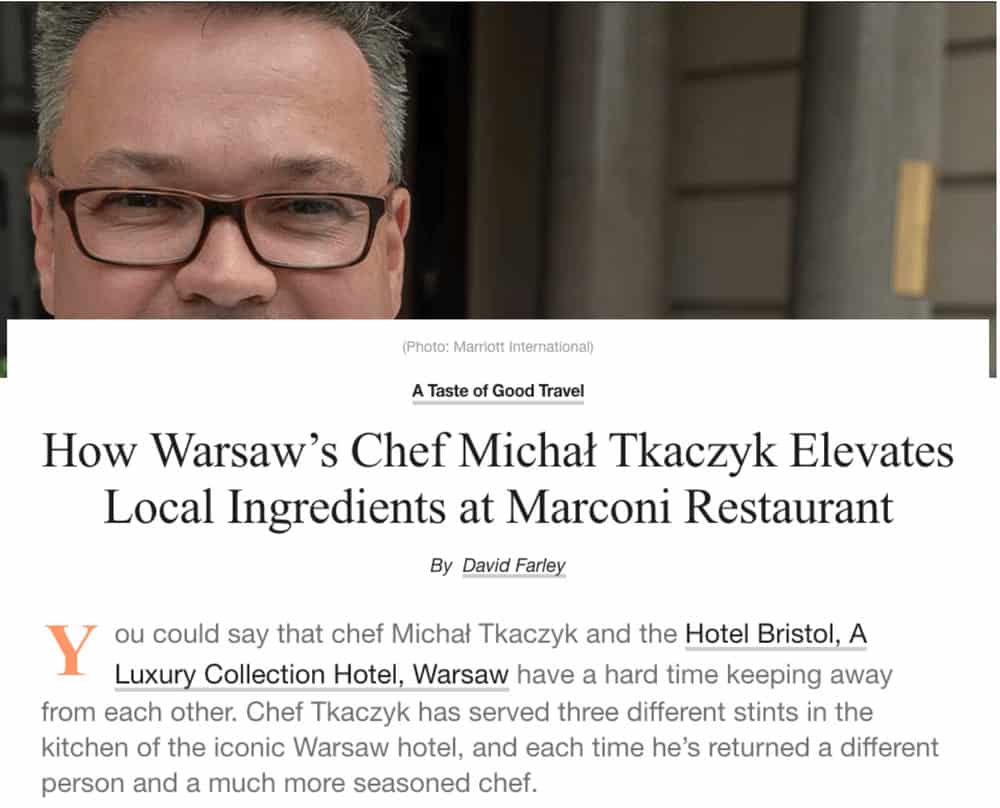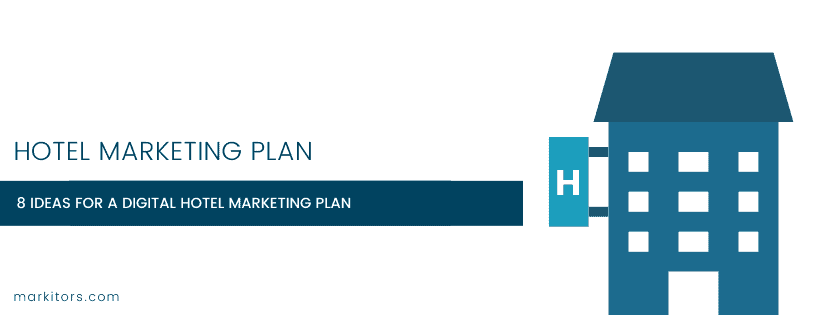
Want to increase direct bookings without paying per click for advertising?
As a digital marketing agency with years of experience in hotel search engine optimization (SEO), we understand how critical direct bookings are to your business. We also know spending thousands on advertising every year isn’t always feasible.
So, if you’re looking for hotel marketing ideas that won’t break the bank, keep reading. Below we discuss all the top hotel marketing strategies to increase direct bookings, build a professional online presence, and reduce paid advertising costs.
- Make your website discoverable with SEO
- Try blogging to increase organic website traffic
- Use micro-influencers to boost your social media status
- Ask for reviews and recommendations from guests
- Promote your hotel with OTAs and GDSs
- Optimize your Google My Business profile
- Get published in local or online publications
- Partner with a university near you to market Your hotel
- Next steps for your digital hotel marketing plan
1. Make your website discoverable with SEO
Direct bookings are king when it comes to hotel marketing.
Of course, getting those direct bookings isn’t always easy. It requires a quality website and a strong online presence.
The days of booking rooms through phone calls are over. 88% of respondents to a recent survey from Statista said they prefer using an online channel to book a hotel.
Still, creating a quality website is only valuable if your prospective guests can find it online. That’s where search engine optimization (SEO) comes into play.
SEO can help you reach the top of search engine results pages (SERPs) for important keywords.
That’s critical because 95% of all internet traffic goes through search engines.
Just imagine someone is looking for a hotel in Austin, Texas. They might type in something like ‘best hotels in Austin’ into Google to start their search.
The first results that come up will be expensive paid ads, which might help you secure booking, but at a cost. Below that, you’ll find organic results where hotel websites can attract customers who will book directly from their site.
In order to rank in those top organic spots in search results for valuable queries like ‘best hotels in Austin,’ you’ll need an SEO strategy. SEO strategies help hotel companies plan, schedule, and outline steps to take in order to improve search engine rankings and appear above online travel agency giants like Travelocity, Hotels.com, and Expedia.
A strong hotel SEO strategy is backed by keyword research and competitor analysis. Plus, you’ll want to do some technical optimization on your website. Tech SEO will help search engines crawl (read) and index (rank) the site properly.
This will involve:
- Optimizing title tags, headers, meta descriptions, and images.
- Fixing site issues like duplicate content, broken links, and errors in XML sitemaps.
- Enhancing mobile and user experience.
- Submitting a sitemap and improving site speed with PageSpeed Insights.
After that, you’ll need to create quality content to draw in organic traffic if you really want to increase bookings. And that’s just the beginning; there’s a lot more that goes into hotel SEO.
Want to learn more on how to optimize your hotel’s site? Read all about hotel SEO.
2. Try blogging to increase organic website traffic
Content marketing, and in particular, blogging, is key to improving your website’s rankings in search engines for important keywords.
It all starts with keyword research to find topics and queries that present high-value targets for your content. Then, you’ll make content tailored to those keywords and topics to draw in organic traffic and increase bookings.
Every hotel marketing plan should include some form of content marketing.
Why?
For one, it increases the web traffic of potential guests. In fact, businesses that blog get 55% more web traffic than those that don’t.
And secondly, it’s been proven to work in the hospitality industry. The ultimate example of content marketing success is Marriott, the largest hotel chain on the planet.
In late 2015, Marriott started Marriott Traveler, a website entirely dedicated to content marketing for their hotels. Just three years later, the company was doubling bookings revenue year over year and had reached over three million unique visitors to the site.
Even better, the content they produce is something you should have no trouble replicating on your site. For example, they often create top destination blogs like this one on seven colored-sand beaches.
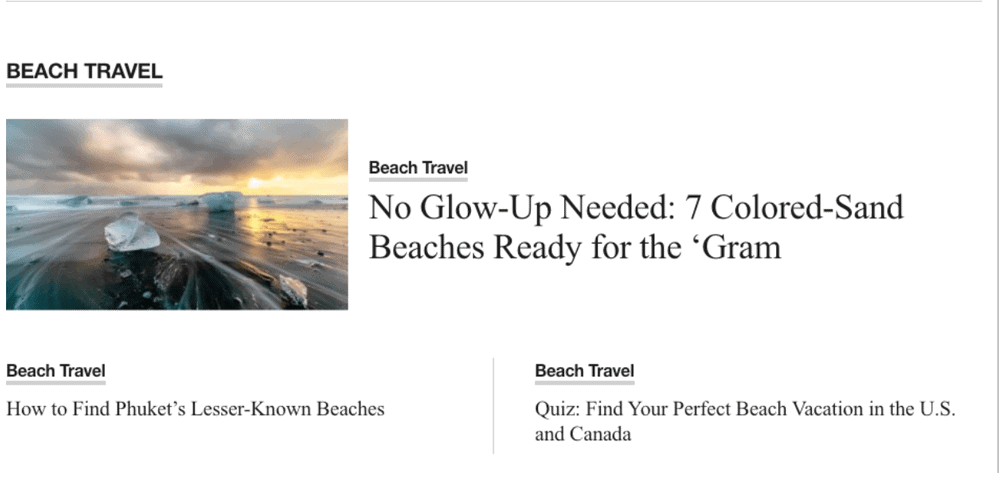
You can imagine if you had a hotel near a colored-sand beach how this article might attract visitors to your site.
Marriott also likes to create articles that touch on their chefs, hotel managers, or staff as a way of showing off a particular hotel. For example, below is an article on Warsaw’s Michal Tkaczysk, the chef at Hotel Bristol.
Their articles provides value for their guests and the community. And it helps Mariott highlight the best aspects of their nicest hotels, without using pushy sales materials.
3. Use micro-influencers to boost your social media status
Influencers on social media can help boost your social media status without the high costs of paid ads. However, sometimes influencers with hundreds of thousands or millions of followers can be a hassle to work with. And, it turns out their posts get far less engagement than their less popular peers.
A recent study from Mobile Marketer found influencers with 10,000 or more followers had a post engagement rate of just 3.6% vs. an over 8.8% engagement rate for micro-influencers with between 1,000 and 5,000 followers.
Not only that, but micro-influencers are also perceived as ‘people like me’ instead of wealthy celebrities. That means the public trusts them more, and that’s exactly what you need for your hotel.
In fact, according to Edelman, 63% of consumers trust what influencers say about brands over what brands say about themselves. So if you want to increase social media engagement to build brand awareness, try micro-influencers.
Here’s an example post from the mico-influencer @comfort.travellers where they partnered with a small hotel in Greece called Cave Pool Suites.
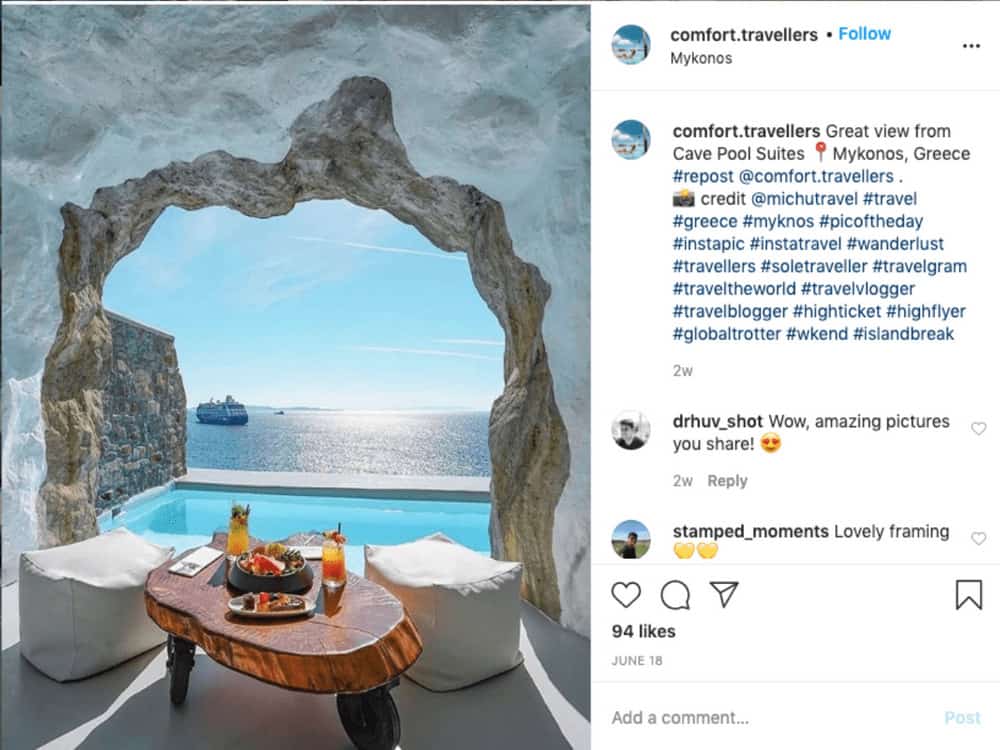
@comfort.travllers only has around 1,200 followers, which as we’ve discussed is actually a positive.
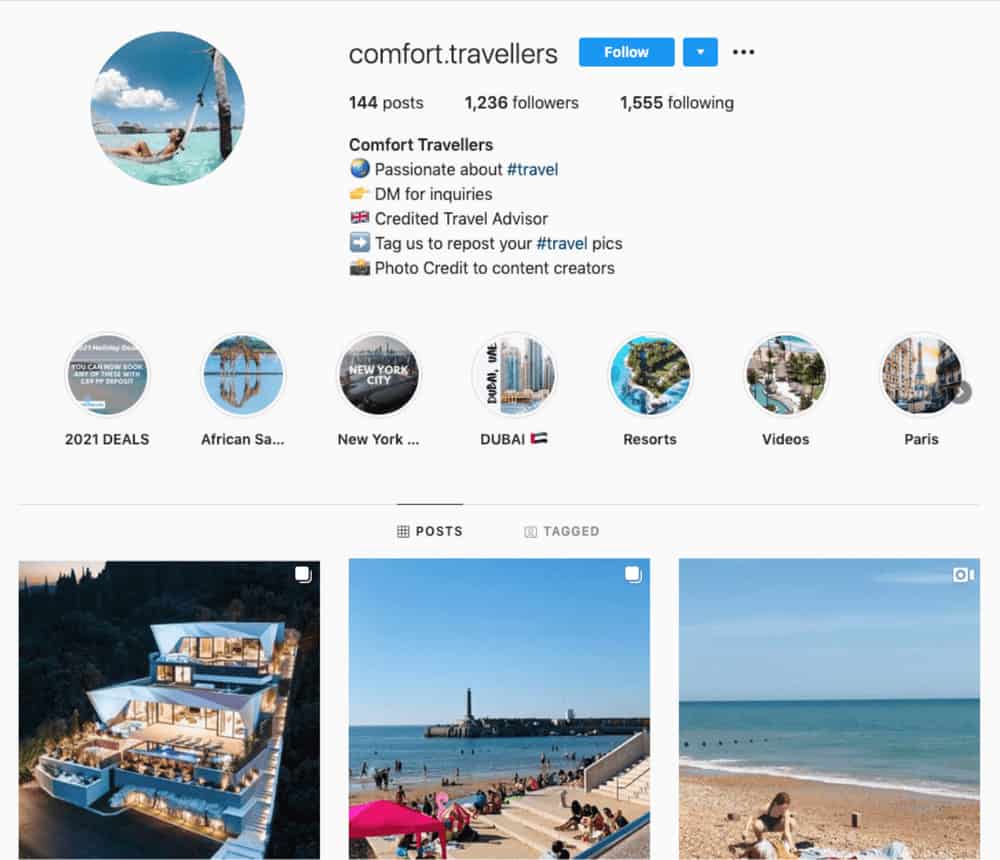
The posts from a micro-influencer like this have strong engagement and are far more trusted than their larger peers.
4. Ask for reviews and recommendations
Asking for reviews and recommendations from current or past guests is an often overlooked hotel marketing strategy that can be very effective.
Prospective guests are looking at reviews before they book now more than ever. According to a TripAdvisor survey, 96% of consumers look at hotel reviews before booking a trip. And a TrustYou Survey found that 88% of travelers filter out hotels with an average star rating below three when looking at OTAs.
For hoteliers, this means asking for reviews from guests who enjoyed their stay is critical to increasing bookings. The good news is some 70% of consumers will leave a review when asked, so don’t be afraid to ask guests for a recommendation at checkout.
You can even shoot a friendly email to past guests to ask if they might leave a review. The more reviews and recommendations you land, the better.
Find out how to boost your hotel’s Google profile by getting more organic reviews.
5. Promote your hotel with OTAs and GDSs
Another hotel marketing strategy to consider is using online travel agencies (OTAs) and global distribution systems (GDSs) to reach as many potential guests as possible.
Using online travel agencies (OTAs)
Hotel owners prefer direct bookings to OTA or GDS bookings, and for a good reason These services come at a price. Both OTAs and GDSs charge fees on top of booking made through their services.
Still, 73% of independent hotel online bookings come from OTAs alone. It’s a marketing channel hotels can’t ignore.
The largest OTAs also spend billions on advertising hotels on their site each year as well. It only makes sense to take advantage of that spending for your hotel. For example, Expedia Group spent a record six billion dollars on marketing in 2019 alone.
OTAs also help bring traffic back to your site for more direct bookings. A survey by Google found that 52% of travelers worldwide visit a hotel brand’s website to book directly only after locating them on an OTA first.
Using global distribution systems (GDSs)
In the past, travel agents dominated the hotel bookings market, but today their role has shrunk significantly.
That doesn’t mean the global distribution systems they use to find bookings aren’t worth using, however. For many hoteliers—especially hotels looking to target corporate or international travelers—GDSs can help increase bookings substantially.
Hotels will pay small initialization fees to get listed on popular GDSs, like Amadeus GDS, Sabre GDS, and Travelport GDS. Then, they’ll pay transaction and/or agent fees on every booking made through the system. The advantage is the systems reach thousands of travel agents all over the world, especially corporate travel agents.
The fees can vary significantly, however, so you’ll need to make sure your profit margin is intact. Overall, GDSs are a marketing channel most can’t ignore.
6. Optimize your Google My Business profile for more leads
Creating and optimizing your Google My Business (GMB) is huge for hotels. GMB profiles feature your business in local results on Google…
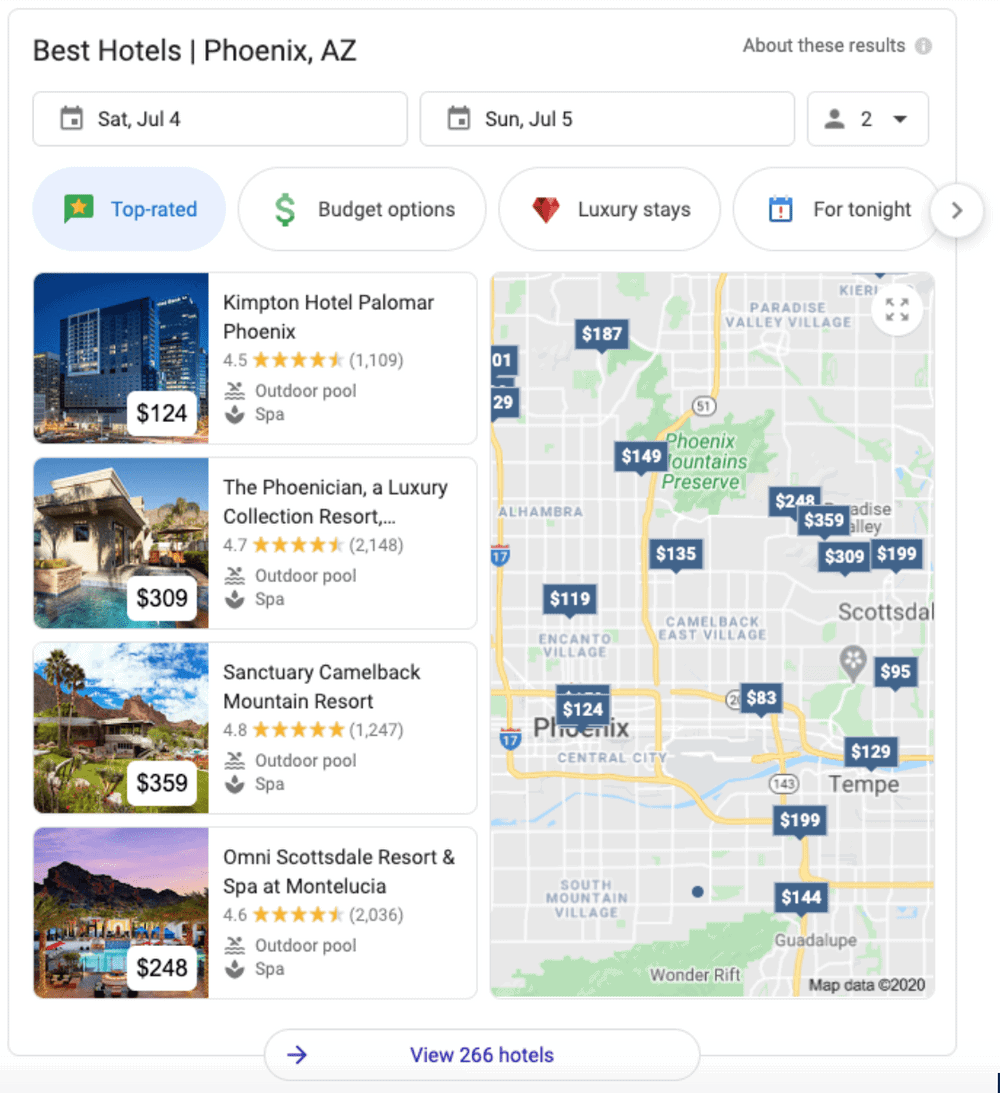
…and on Google Maps.
These are high traffic spots that build brand awareness, increase leads, and create a professional hotel image.
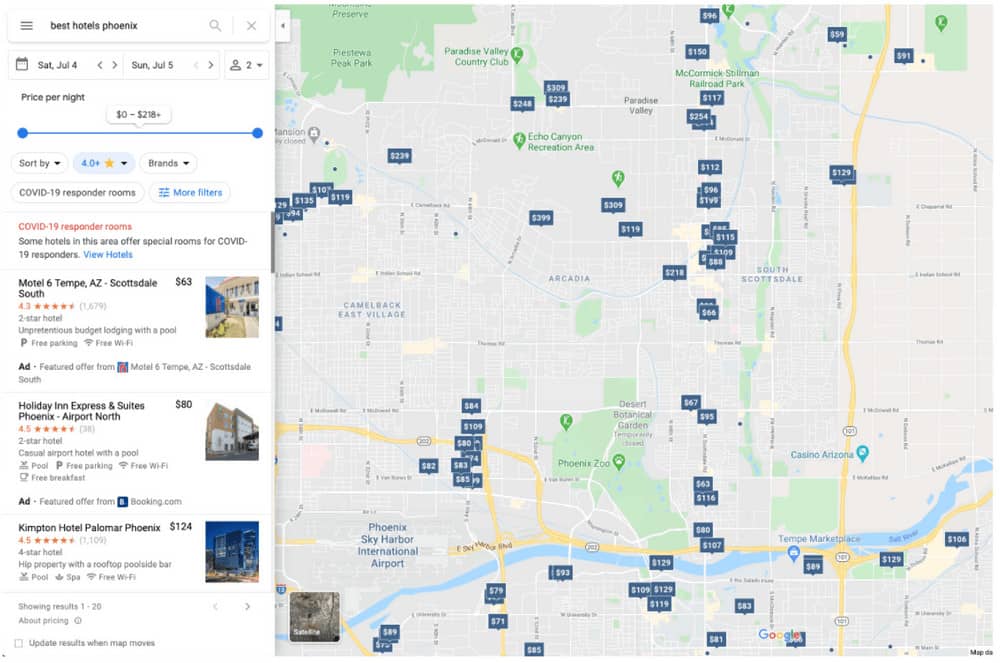
Even better, Google recently created a whole suite of unique services for hotels on Google My Business. For example, you can now allow guests to book through Google using Google Hotel Ads.
Google can also evaluate your hotel and give it a hotel class rating to improve your brand reputation. On top of that, GMB profiles for hotels also allow owners or marketing managers to:
- Include basic information in the knowledge panel.
- Add hotel amenities, highlights, and business hours.
- Reply to customer reviews.
- Add photos and videos.
- Answer questions about your hotel with a Q&A section.
- Chat directly with your customers, live.
Considering all the recent updates, you really can’t miss out on this hotel marketing idea. Google also recently added extensive analytics on people’s interactions with hotels via Google for hotel owners.
Additionally, with local SEO you can increase your GMB’s visibility in local search results and Google Maps to supercharge your results. So don’t wait and create your Google My Business profile as soon as possible.
7. Get published in local or online publications
Hotel owners have a lot of knowledge from their years of experience in the hospitality industry. One hotel marketing strategy you might not have considered is to share that knowledge free of charge in industry or online publications.
You can create articles that detail industry tips and tricks, FAQs, or how-tos to help build brand awareness.
Why spend the time to create an article? For a couple of reasons. First, sharing your knowledge in industry publications or online blogs can establish you as an industry leader in your hospitality niche.
Second, if your article is published online on an authoritative, relevant site, it can help boost your rankings in search engines by improving your backlink profile.
Even if you don’t have the time to share information in an article, getting digital PR services to help you get published and receive the benefits from the strategy just makes sense.
For example, you might secure a spot in an article like this one on The 10 Best Hotels in Phoenix.
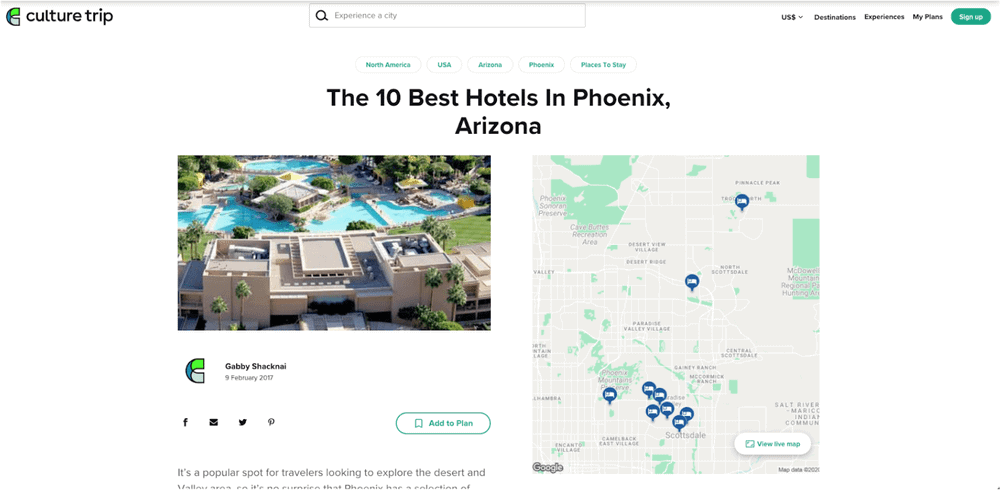
The article could help generate bookings, and it will help establish a hotel’s brand reputation in the area. From blogs like the one above to securing quote placements, digital PR services are an ideal brand-building strategy.
8. Partner with a university near you to market your hotel
The final hotel marketing idea we have for you is one that many hotel owners probably haven’t considered—partnering with a university.
Large public universities have thousands of students, alumni, and staff that you can connect with by becoming a hotel partner. You’ll need to offer small discounts or promotions to be listed as a featured hotel for the university, but it is well worth the cost.
For example, Arizona State University has dozens of hotels listed all across the country on their site. Each offers a small discount for school patrons in order to be listed.
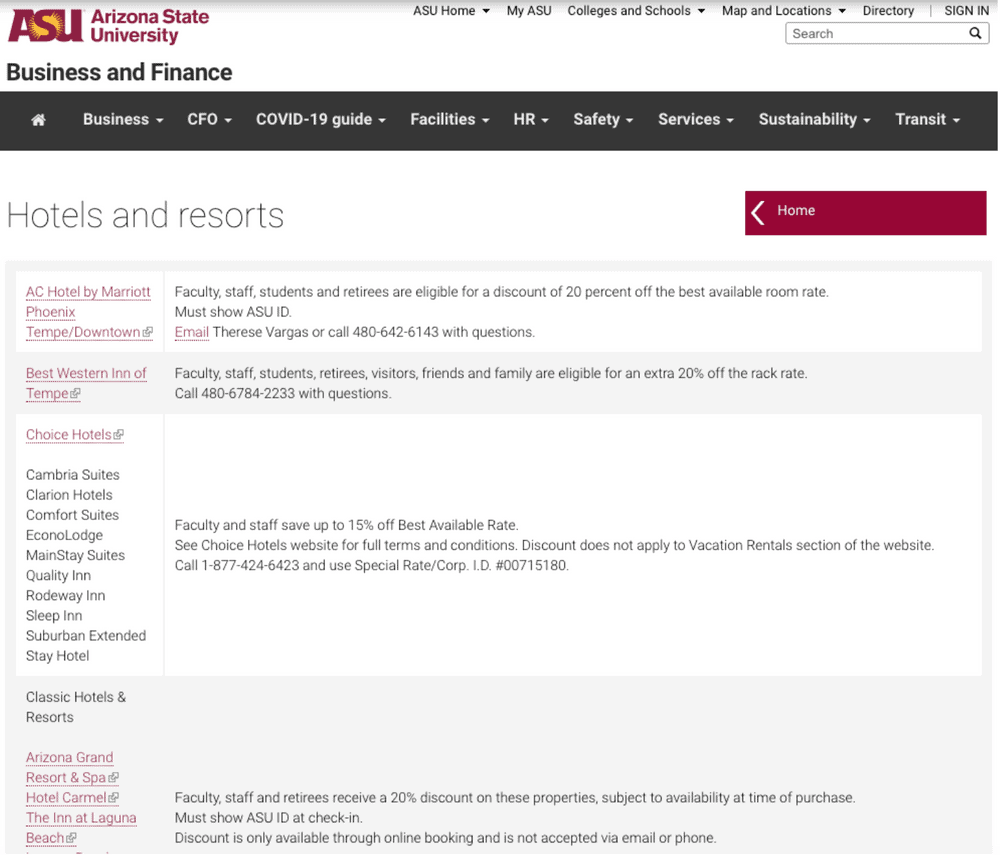
There are several benefits to this. First, you can earn a high-quality backlink on an authoritative, relevant ‘.edu’ website. The link should help boost your authority, improving your rankings for important keywords in search engines.
Second, university sites get a lot of web traffic, so a listing on their hotel page can be a solid lead generation tactic for bookings. And finally, partnering with a large university helps create a more professional online image.
Next steps for your digital hotel marketing plan
Digital marketing for hotels doesn’t happen overnight. There’s a lot of work involved.
If you don’t have the time to blog, optimize your website for search engines, or partner with a university, don’t be afraid to call in the SEO experts.
We would be more than happy to help you with your hotel marketing strategies.
Markitors helps small businesses rank higher on Google to attract more leads and increase revenue. Explore what’s in our SEO toolbox: audits and keyword research, digital PR, technical SEO, and local SEO.


